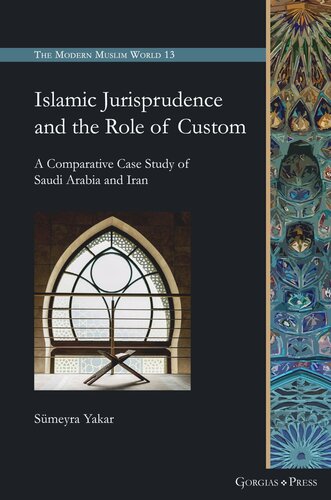

Most ebook files are in PDF format, so you can easily read them using various software such as Foxit Reader or directly on the Google Chrome browser.
Some ebook files are released by publishers in other formats such as .awz, .mobi, .epub, .fb2, etc. You may need to install specific software to read these formats on mobile/PC, such as Calibre.
Please read the tutorial at this link: https://ebookbell.com/faq
We offer FREE conversion to the popular formats you request; however, this may take some time. Therefore, right after payment, please email us, and we will try to provide the service as quickly as possible.
For some exceptional file formats or broken links (if any), please refrain from opening any disputes. Instead, email us first, and we will try to assist within a maximum of 6 hours.
EbookBell Team

5.0
18 reviewsThe book argues for the importance of custom (‘urf) in the application of Islamic law in Iran and Saudi Arabia. Irrespective of whether there is a direct reference to ‘urf, the interpretation and use of Islamic legal principles have a relatively close connection to the surrounding contextual environment and customs. The extensive use of customary norms in the absence of legal sources or in the course of interpretation of legal texts are in excess of the permitted legal limits. The book compares the diversity of legal opinions and court verdicts between the two countries by placing a particular emphasis upon the usage of ‘urf, whether in the form of a legal principle with semi-independent style or the form of a subsidiary source that is dependent upon various legal principles. The latter includes istiḥsān, (common practice), istiṣlāḥ (common good), istiṣḥāb (presumption of continuity) sadd al-dharā’i‘ (blocking the means), ḍarūra (necessity), and siyāsa shar‘iyya (politics in accordance with the Islamic law). The study compares approaches adopted by Saudi-Ḥanbalī and Iranian-Ja‘farī scholars towards the shar‘ī status of ‘urf (custom) in three particular categories; the methodological perspective (classic and contemporary), the shar‘ī opinions of scholars (fatwā) and the court verdicts of judges (aḥkām). It illustrates the ways in which scholars achieve different implementations in their sharī‘a systems through the application of direct or indirect ‘urf. In addition, the book examines the extent to which the shar‘ī regulations have been altered or sustained through the prioritisation of the legal concept of ‘urf. The attitude of ‘ulamā’ (religious scholars) towards the application of ‘urf demonstrates that both the classical Ḥanbalī and Ja‘farī schools have approved the validity of ‘urf in the shar‘ī area. This applies both to direct usage of ‘urf and manipulations of its utility by rational explanations or secondary legal principles.